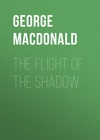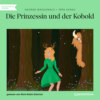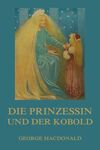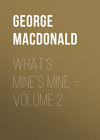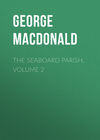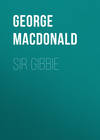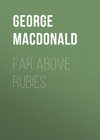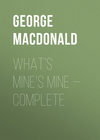Buch lesen: «The Flight of the Shadow», Seite 8
CHAPTER XXII. JOHN RECALLS AND REMEMBERS
What a weight was off my heart! It seemed as if nothing more could go wrong. But, though John was plainly happy, he was not quite comfortable: he worried himself with trying to remember how he had come to us. The last thing he could definitely recall before finding himself with us, was his mother looking at him through a night that seemed made of blackness so solid that he marvelled she could move in it. She brought him something to drink, but he fancied it blood, and would not touch it. He remembered now that there was a red tumbler in his room. He could recall nothing after, except a cold wind, and a sense of utter weariness but absolute compulsion: he must keep on and on till he found the gate of heaven, to which he seemed only for ever coming nearer. His conclusion was, that he knew what he was about every individual moment, but had no memory; each thing he did was immediately forgotten, while the knowledge of what he had to do next remained with him. It was, he thought, a mental condition analogous with walking, in which every step is a frustrated fall. I set this down here, because, when I told my uncle what John had been saying, myself not sure that I perceived what he meant, he declared the boy a philosopher of the finest grain. But he warned me not to encourage his talking, and especially not to ask him to explain. There was nothing, he said, worse for a weak brain, than to set a strong will to work it.
I tried to obey him, but it grew harder as the days went on. There were not many of them, however; he recovered rapidly. When at length my uncle talked not only to but with him, I regarded it as a virtual withdrawal of his prohibition, and after that spoke to John of whatever came into his or my head.
It was then he told me all he could remember since the moment he left me with his supper in his hand. A great part of his recollection was the vision of my uncle on the moor, and afterward in the park. We did not know what to make of it. I should at once have concluded it caused by prelusive illness, but for my remembrance of what both my uncle and myself had seen, so long before, in the thunderstorm; while John, willing enough to attribute its recurrence to that cause, found it impossible to concede that he was anything but well when crossing the moor. I thought, however, that excitement, fatigue, and lack of food, might have something to do with it, and with his illness too; while, if he was in a state to see anything phantasmal, what shape more likely to appear than that of my uncle!
He would not hear of my mentioning the thing to my uncle. I would for my own part have gone to him with it immediately; but could not with John’s prayer in my ears. I resolved, however, to gain his consent if I could.
He had by this time as great a respect for my uncle as I had myself, but could not feel at home with him as I did. Whether the vision was only a vision, or indeed my uncle’s double, whatever a double may be, the tale of it could hardly be an agreeable one to him; and naturally John shrank from the risk of causing him the least annoyance.
The question of course came up, what he was to do when able to leave us. He had spoken very plainly to my uncle concerning his relations with his mother—had told him indeed that he could not help suspecting he owed his illness to her.
I was nearly always present when they talked, but remember in especial a part of what passed on one occasion.
“I believe I understand my mother,” said John, “—but only after much thinking. I loved her when a child; and if she had not left me for the sake of liberty and influence—that at least is how I account for her doing so—I might at this moment be struggling for personal freedom, instead of having that over.”
“There are women,” returned my uncle, “some of them of the most admired, who are slaves to a demoniacal love of power. The very pleasure of their consciousness consists in the knowledge that they have power—not power to do things, but power to make other people do things. It is an insanity, but a devilishly immoral and hateful insanity.—I do not say the lady in question is one of such, for I do not know her; I only say I have known such a one.”
John replied that certainly the love of power was his mother’s special weakness. She was spoiled when a child, he had been told; had her every wish regarded, her every whim respected. This ruinous treatment sprang, he said, from the self-same ambition, in another form, on the part of her mother—the longing, namely, to secure her child’s supreme affection—with the natural consequence that they came to hate one another. His father and she had been married but fifteen months, when he died of a fall, following the hounds. Within six months she was engaged, but the engagement was broken off, and she went abroad, leaving him behind her. She married lord Cairnedge in Venice, and returned to England when John was nearly four, and seemed to have lost all memory of her. His stepfather was good to him, but died when he was about eight. His mother was very severe. Her object plainly was to plant her authority so in his very nature, that he should never think of disputing her will.
“But,” said John, “she killed my love, and so I grew able to cast off her yoke.”
“The world would fare worse, I fancy,” remarked my uncle, “if violent women bore patient children. The evil would become irremediable. The children might not be ruined, but they would bring no discipline to the mother!”
“Her servants,” continued John, “obey her implicitly, except when they are sure she will never know. She treats them so imperiously, that they admire her, and are proud to have such a mistress. But she is convinced at last, I believe, that she will never get me to do as she pleases; and therefore hates me so heartily, that she can hardly keep her ladylike hands off me. I do not think I have been unreasonable; I have not found it difficult to obey others that were set over me; but when I found almost her every requirement part of a system for reducing me to a slavish obedience, I began to lay down lines of my own. I resolved to do at once whatever she asked me, whether pleasant to me or not, so long as I saw no reason why it should not be done. Then I was surprised to find how seldom I had to make a stand against her wishes. At the same time, the mode in which she conveyed her pleasure, was invariably such as to make a pretty strong effort of the will necessary for compliance with it. But the effort to overcome the difficulty caused by her manner, helped to develop in me the strength to resist where it was not right to yield. By far the most serious difference we had yet had, arose about six months ago, when she insisted I should make myself agreeable to a certain lady, whom I by no means disliked. She had planned our marriage, I believe, as one of her parallels in the siege of the lady’s noble father, then a widower of a year. I told her I would not lay myself out to please any lady, except I wanted to marry her. ‘And why, pray, should you not marry her?’ she returned. I answered that I did not love her, and would not marry until I saw the woman I could not be happy without, and she accepted me. She went into a terrible passion, but I found myself quite unmoved by it: it is a wonderful heartener to know yourself not merely standing up for a right, but for the right to do the right thing! ‘You wouldn’t surely have me marry a woman I didn’t care a straw for!’ I said. ‘Quench my soul!’ she cried—I have often wondered where she learned the oath—‘what would that matter? She wouldn’t care a straw for you in a month!’—‘Why should I marry her then?’—‘Because your mother wishes it,’ she replied, and turned to march from the room as if that settled the thing. But I could not leave it so. The sooner she understood the better! ‘Mother!’ I cried, ‘I will not marry the lady. I will not pay her the least attention that could be mistaken to mean the possibility of it.’ She turned upon me. I have just respect enough left for her, not to say what her face suggested to me. She was pale as a corpse; her very lips were colourless; her eyes—but I will not go on. ‘Your father all over!’ she snarled—yes, snarled, with an inarticulate cry of fiercest loathing, and turned again and went. If I do not quite think my mother, at present, would murder me, I do think she would do anything short of murder to gain her ends with me. But do not be afraid; I am sufficiently afraid to be on my guard.
“My father was a rich man, and left my mother more than enough; there was no occasion for her to marry again, except she loved, and I am sure she did not love lord Cairnedge. I wish, for my sake, not for his, he were alive now. But the moment, I am one and twenty, I shall be my own master, and hope, sir, you will not count me unworthy to be the more Belorba’s servant. One thing I am determined upon: my mother shall not cross my threshold but at my wife’s invitation; and I shall never ask my wife to invite her. She is too dangerous.
“We had another altercation about Miss Miles, an hour or two before I first saw Orba. They were far from worthy feelings that possessed me up to the moment when I caught sight of her over the wall. It was a leap out of hell into paradise. The glimpse of such a face, without shadow of scheme or plan or selfish end, was salvation to me. I thank God!”
Perhaps I ought not to let those words about myself stand, but he said them.
He had talked too long. He fell back in his chair, and the tears began to gather in his eyes. My uncle rose, put his arm about me, and led me to the study.
“Let him rest a bit, little one,” he said as we entered. “It is long since we had a good talk!”
He seated himself in his think-chair—a name which, when a child, I had given it, and I slid to the floor at his feet.
“I cannot help thinking, little one,” he began, “that you are going to be a happy woman! I do believe that is a man to be trusted. As for the mother, there is no occasion to think of her, beyond being on your guard against her. You will have no trouble with her after you are married.”
“I cannot help fearing she will do us a mischief, uncle,” I returned.
“Sir Philip Sidney says—‘Since a man is bound no further to himself than to do wisely, chance is only to trouble them that stand upon chance.’ That is, we are responsible only for our actions, not for their results. Trust first in God, then in John Day.”
“I was sure you would like him, uncle!” I cried, with a flutter of loving triumph.
“I was nearly as sure myself—such confidence had I in the instinct of my little one. I think that I, of the two of us, may, in this instance, claim the greater faith!”
“You are always before me, uncle!” I said. “I only follow where you lead. But what do you think the woman will do next?”
“I don’t think. It is no use. We shall hear of her before long. If all mothers were like her, the world would hardly be saved!”
“It would not be worth saving, uncle.”
“Whatever can be saved, must be worth saving, my child.”
“Yes, uncle; I shouldn’t have said that,” I replied.
CHAPTER XXIII. LETTER AND ANSWER
We did hear of her before long. The next morning a letter was handed to my uncle as we sat at breakfast. He looked hard at the address, changed countenance, and frowned very dark, but I could not read the frown. Then his face cleared a little; he opened, read, and handed the letter to me.
Lady Cairnedge hoped Mr. Whichcote would excuse one who had so lately come to the neighbourhood, that, until an hour ago, she knew nothing of the position and character of the gentleman in whose house her son had, in a momentary, but, alas! not unusual aberration, sought shelter, and found generous hospitality. She apologized heartily for the unceremonious way in which she had sent for him. In her anxiety to have him home, if possible, before he should realize his awkward position in the house of a stranger, she had been inconsiderate! She left it to the judgment of his kind host whether she should herself come to fetch him, or send her carriage with the medical man who usually attended him. In either case her servants must accompany the carriage, as he would probably object to being removed. He might, however, be perfectly manageable, for he was, when himself, the gentlest creature in the world!
I was in a rage. I looked up, expecting to see my uncle as indignant with the diabolical woman as I was myself. But he seemed sunk in reverie, his body present, his spirit far away. A pang shot through my heart. Could the wicked device have told already?
“May I ask, uncle,” I said, and tried hard to keep my voice steady, “how you mean to answer this vile epistle?”
He looked up with a wan smile, such as might have broke from Lazarus when he found himself again in his body.
“I will take it to the young man,” he answered.
“Please, let us go at once then, uncle! I cannot sit still.”
He rose, and we went together to John’s room.
He was much better—sitting up in bed, and eating the breakfast Penny had carried him.
“I have just had a letter from your mother, Day,” said my uncle.
“Indeed!” returned John dryly.
“Will you read it, and tell me what answer you would like me to return.”
“Hardly like her usual writing—though there’s her own strange S!” remarked John as he looked at it.
“Does she always make an S like that?” asked my uncle, with something peculiar in his tone, I thought.
“Always—like a snake just going to strike.”
My uncle’s face grew ghastly pale. He almost snatched the letter from John’s hand, looked at it, gave it back to him, and, to our dismay, left the room.
“What can be the matter, John?” I said, my heart sinking within me.
“Go to him,” said John.
I dared not. I had often seen him like that before walking out into the night; but there was something in his face now which I had not seen there before. It looked as if some terrible suspicion were suddenly confirmed.
“You see what my mother is after!” said John. “You have now to believe her, that I am subject to fits of insanity, or to believe me, that there is nothing she will not do to get her way.”
“Her object is clear,” I replied. “But if she thinks to fool my uncle, she will find herself mistaken!”
“She hopes to fool both you and your uncle,” he rejoined. “The only wise thing I could do, she will handle so as to convince any expert of my madness—I mean, my coming to you! My reasons will go for nothing—less than no-thing—with any one she chooses to bewitch. She will look at me with an anxious love no doctor could doubt. No one can know you do not know that I am not mad—or at least subject to attacks of madness!”
“Oh, John, don’t frighten me!” I cried.
“There! you are not sure about it!”
It seemed cruel of him to tease me so; but I saw presently why he did it: he thought his mother’s letter had waked a doubt in my uncle; and he wanted me not to be vexed with my uncle, even if he deserted him and went over to his mother’s side.
“I love your uncle,” he said. “I know he is a true man! I will not be angry with him if my mother do mislead him. The time will come when he will know the truth. It must appear at last! I shall have to fight her alone, that’s all! The worst is, if he thinks with my mother I shall have to go at once!—If only somebody would sell my horse for me!”
I guessed that his mother kept him short of money, and remembered with gladness that I was not quite penniless at the moment.
“In the meantime, you must keep as quiet as you can, John,” I said. “Where is the good of planning upon an if? To trust is to get ready, uncle says. Trust is better than foresight.”
John required little such persuading. And indeed something very different was in my uncle’s mind from what John feared.
Presently I caught a glimpse of him riding out of the yard. I ran to a window from which I could see the edge of the moor, and saw him cross it at an uphill gallop.
He was gone about four hours, and on his return went straight to his own room. Not until nine o’clock did I go to him, and then he came with me to supper.
He looked worn, but was kind and genial as usual. After supper he sent for Dick, and told him to ride to Rising, the first thing in the morning, with a letter he would find on the hall-table.
The letter he read to us before we parted for the night. It was all we could have wished. He wrote that he must not have any one in his house interfered with; so long as a man was his guest, he was his servant. Her ladyship had, however, a perfect right to see her son, and would be welcome; only the decision as to his going or remaining must rest with the young man himself. If he chose to accompany his mother, well and good! though he should be sorry to lose him. If he declined to return with her, he and his house continued at his service.
CHAPTER XXIV. HAND TO HAND
We looked for lady Cairnedge all the next day. John was up by noon, and ready to receive her in the drawing-room; he would not see her in his bedroom. But the hours passed, and she did not come.
In the evening, however, when the twilight was thickening, and already all was dark in the alleys of the garden, her carriage drove quietly up—with a startling scramble of arrest at the door. The same servants were outside, and a very handsome dame within. As she descended, I saw that she was tall, and, if rather stout, not stouter than suited her age and style. Her face was pale, but she seemed in perfect health. When I saw her closer, I found her features the most regular I had ever seen. Had the soul within it filled the mould of that face, it would have been beautiful. As it was, it was only handsome—to me repulsive. The moment I saw it, I knew myself in the presence of a masked battery.
My uncle had insisted that she should be received where we usually sat, and had given Penny orders to show her into the hall-kitchen.
I was alone there, preparing something for John. We were not expecting her, for it seemed now too late to look for her. My uncle was in the study, and Martha somewhere about the house. My heart sank as I turned from the window, and sank yet lower when she appeared in the doorway of the kitchen. But as I advanced, I caught sight of my uncle, and went boldly to meet the enemy. He had come down his stair, and had just stepped into a clear blaze of light, which that moment burst from the wood I had some time ago laid damp upon the fire. The next instant I saw the lady’s countenance ghastly with terror, looking beyond me. I turned, but saw nothing, save that my uncle had disappeared. When I faced her again, only a shadow of her fright remained. I offered her my hand—for she was John’s mother, but she did not take it. She stood scanning me from head to foot.
“I am lady Cairnedge,” she said. “Where is my son?”
I turned yet again. My uncle had not come back. I was not prepared to take his part. I was bewildered. A dead silence fell. For the first time in my life, my uncle seemed to have deserted me, and at the moment when most I needed him! I turned once more to the lady, and said, hardly knowing what,
“You wish to see Mr. Day?”
She answered me with a cold stare.
“I will go and tell him you are here,” I faltered; and passing her, I sped along the passage to the drawing-room.
“John!” I cried, bursting in, “she’s come! Do you still mean to see her? Are you able? Uncle—”
There I stopped, for his eyes were stern, and not looking at me, but at something behind me. One moment I thought his fever had returned, but following his gaze I looked round:—there stood lady Cairnedge! John was face to face with his mother, and my uncle was not there to defend him!
“Are you ready?” she said, nor pretended greeting. She seemed slightly discomposed, and in haste.
I was by this time well aware of my lover’s determination of character, but I was not prepared for the tone in which he addressed the icy woman calling herself his mother.
“I am ready to listen,” he answered.
“John!” she returned, with mingled severity and sharpness, “let us have no masquerading! You are perfectly fit to come home, and you must come at once. The carriage is at the door.”
“You are quite right, mother,” answered John calmly; “I am fit to go home with you. But Rising does not quite agree with me. I dread such another attack, and do not mean to go.”
The drawing-room had a rectangular bay-window, one of whose three sides commanded the door. The opposite side looked into a little grove of larches. Lady Cairnedge had already realized the position of the room. She darted to the window, and saw her carriage but a few yards away.
She would have thrown up the sash, but found she could not. She twisted her handkerchief round her gloved hand, and dashed it through a pane.
“Men!” she cried, in a loud, commanding voice, “come at once.”
The moment she went to the window, I sprang to the door, locked it, put the key in my pocket, and set my back to the door.
I heard the men thundering at the hall-door. Lady Cairnedge turned as if she would herself go and open to them, but seeing me, she understood what I had done, and went back to the window.
“Come here! Come to me here—to the window!” she cried.
John had been watching with a calm, determined look. He came and stood between us.
“John,” I said, “leave your mother to me.”
“She will kill you!” he answered.
“You might kill her!” I replied.
I darted to the chimney, where a clear fire was burning, caught up the poker, and thrust it between the bars.
“That’s for you!” I whispered. “They will not touch you with that in your hand! Never mind me. If your mother move hand or foot to help them, it will be my turn!”
He gave me a smile and a nod, and his eyes lightened. I saw that he trusted me, and I felt fearless as a bull-dog.
In the meantime, she had spoken to her servants, and was now trying to open the window, which had a peculiar catch. I saw that John could defend himself much better at the window than in the room. I went softly behind his mother, put my hands round her neck, and clasping them in front, pulled her backward with all my strength. We fell on the floor together, I under of course, but clutching as if all my soul were in my fingers. Neither should she meddle with John, nor should he lay hand on her! I did not mind much what I did to her myself.
“To the window, John,” I cried, “and break their heads!”
He snatched the poker from the fire, and the next moment I heard a crashing of glass, but of course I could not see what was going on. Mine was no grand way of fighting, but what was dignity where John was in danger! For the moment I had the advantage, but, while determined to hold on to the last, I feared she would get the better of me, for she was much bigger and stronger, and crushed and kicked, and dug her elbows into me, struggling like a mad woman.
All at once the tug of her hands on mine ceased. She gave a great shriek, and I felt a shudder go through her. Then she lay still. I relaxed my hold cautiously, for I feared a trick. She did not move. Horror seized me; I thought I had killed her. I writhed from under her to see. As I did so, I caught sight of the pale face of my uncle, looking in at that part of the window next the larch-grove. Immediately I remembered lady Cairnedge’s terror in the kitchen, and knew that the cause of it, and of her present cry, must be the same, to wit, the sight of my uncle. I had not hurt her! I was not yet on my feet when my uncle left the window, flew to the other side of it, and fell upon the men with a stick so furiously that he drove them to the carriage. The horses took fright, and went prancing about, rearing and jibbing. At the call of the coachman, two of the men flew to their heads. I saw no more of their assailant.
John, who had not got a fair blow at one of his besiegers, left the window, and came to me where I was trying to restore his mother. The third man, the butler, came back to the window, put his hand through, undid the catch, and flung the sash wide. John caught up the poker from the floor, and darted to it.
“Set foot within the window, Parker,” he cried, “and I will break your head.”
The man did not believe he would hurt him, and put foot and head through the window.
Now John had honestly threatened, but to perform he found harder than he had thought: it is one thing to raise a poker, and another to strike a head with it. The window was narrow, and the whole man was not yet in the room, when John raised his weapon; but he could not bring the horrid poker down upon the dumb blind back of the stooping man’s head. He threw it from him, and casting his eyes about, spied a huge family-bible on a side-table. He sprang to it, and caught it up—just in time. The man had got one foot firm on the floor, and was slowly drawing in the other, when down came the bible on his head, with all the force John could add to its weight. The butler tumbled senseless on the floor.
“Here, Orbie!” cried John; “help me to bundle him out before he comes to himself—Take what you would have!” he said, as between us we shoved him out on the gravel.
I fetched smelling-salts and brandy, and everything I could think of—fetched Martha too, and between us we got her on the sofa, but lady Cairnedge lay motionless. She breathed indeed, but did not open her eyes. John stood ready to do anything for her, but his countenance revealed little compassion. Whatever the cause of his mother’s swoon—he had never seen her in one before—he was certain it had to do with some bad passage in her life. He said so to me that same evening. “But what could the sight of my uncle have to do with it?” I asked. “Probably he knows something, or she thinks he does,” he answered.
“Wouldn’t it be better to put her to bed, and send for the doctor, John?” I suggested at last.
Perhaps the sound of my voice calling her son by his Christian name, stung her proud ear, for the same moment she sat up, passed her hands over her eyes, and cast a scared gaze about the room.
“Where am I? Is it gone?” she murmured, looking ghastly.
No one answered her.
“Call Parker,” she said, feebly, yet imperiously.
Still no one spoke.
She kept glancing sideways at the window, where nothing was to be seen but the gathering night. In a few moments she rose and walked straight from the room, erect, but white as a corpse. I followed, passed her, and opened the hall-door. There stood the carriage, waiting, as if nothing unusual had happened, Parker seated in the rumble, with one of the footmen beside him. The other man stood by the carriage-door. He opened it immediately; her ladyship stepped in, and dropped on the seat; the carriage rolled away.
I went back to John.
“I must leave you, darling!” he said. “I cannot subject you to the risk of such another outrage! I fear sometimes my mother may be what she would have you think me. I ought to have said, I hope she is. It would be the only possible excuse for her behaviour. The natural end of loving one’s own way, is to go mad. If you don’t get it, you go mad; if you do get it, you go madder—that’s all the difference!—I must go!”
I tried to expostulate with him, but it was of no use.
“Where will you go?” I said. “You cannot go home!”
“I would at once,” he answered, “if I could take the reins in my own hands. But I will go to London, and see the family-lawyer. He will tell me what I had better do.”
“You have no money!” I said.
“How do you know that?” he returned with a smile. “Have you been searching my pockets?”
“John!” I cried.
He broke into a merry laugh.
“Your uncle will lend me a five-pound-note,” he said.
“He will lend you as much as you want; but I don’t think he’s in the house,” I answered. “I have two myself, though! I’ll run and fetch them.”
I bounded away to get the notes. It was like having a common purse already, to lend John ten pounds! But I had no intention of letting him leave the house the same day he was first out of his room after such an illness—that was, if I could help it.
My uncle had given me the use of a drawer in that same cabinet in which were the precious stones; and there, partly, I think, from the pride of sharing the cabinet with my uncle, I had long kept everything I counted precious: I should have kept Zoe there if she had not been alive and too big!
